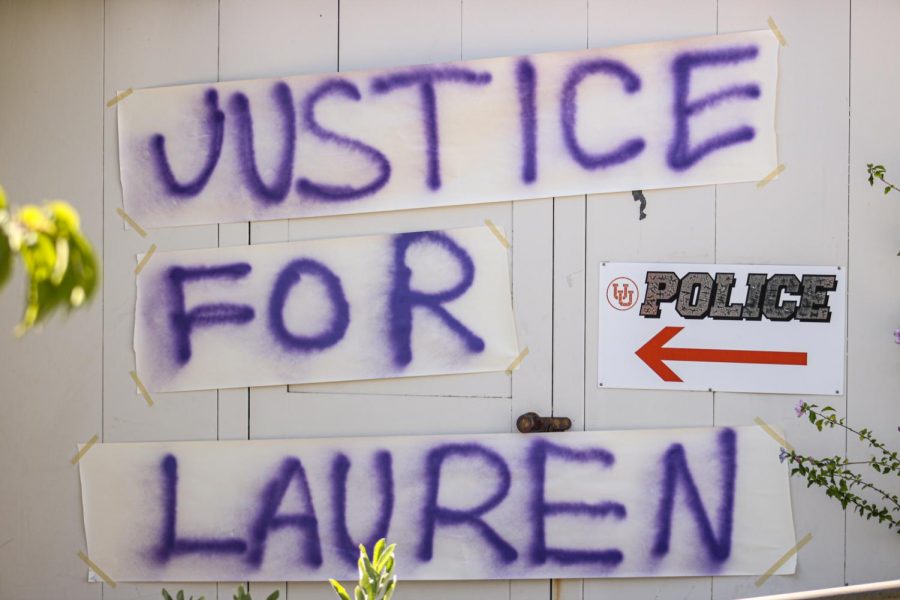Weglinski: Let’s Protect Stalking Victims, Not Make Things Harder for Them
UnsafeU protesters gather at the Public Safety Building on the University of Utah campus in Salt Lake City to protest the actions of officers involved in the Lauren McCluskey case on Aug. 6, 2020. (Ivana Martinez | The Daily Utah Chronicle)
February 12, 2021
Reports of stalking have significantly increased across Utah colleges and universities in the last few years. At the University of Utah, stalking reports spiked more than 100% between 2018 and 2019. While a rise in data may mean more victims are comfortable coming forward with allegations, even that won’t hold true for long if lawmakers pass H.B. 21.
Sponsored by Rep. Candice Pierucci and Sen. Lincoln Fillmore, H.B. 21 would tighten the language in Utah’s criminal stalking code, making it harder for stalking victims to press charges against their perpetrators. Utah’s statute currently defines stalking as “two or more acts directed at or towards a person” that cause “emotional distress.” However, under H.B. 21, victims would have to prove their aggressors’ “continuity of purpose,” which would make it difficult to obtain stalking injunctions. “The proposed change will only make the process harder for those who need protection,” said stalking victim Megan Mullineaux to the Salt Lake Tribune.
Now is not the time to amend the stalking statute in Utah. If Utah lawmakers care about stalking and sexual assault victims — or the women of this state at large — they will not pass this bill. Not only would these changes make it more difficult for stalking victims to seek emotional help and support, but it would discourage many from reporting incidences in fear of not having enough evidence.
Pierucci originally introduced this bill because of a constituent who came to her after being jailed on false accusations of stalking. While this was an unfortunate and unjust incident, it shouldn’t result in amendments of Utah’s criminal stalking code. In fact, our state already has one of the most precise legal stalking definitions nationwide, and even then some victims have struggled to provide substantive proof. Adding language about “continuity of purpose” to Utah’s statute would force victims to prove that they’re facing an explicit and deliberate pattern of abuse, which can be extremely difficult. Speaking of his wife’s stalker to the Salt Lake Tribune, one man said, “The stalker is aware of what he’s doing and covering his tracks very well… It’s making it all very difficult to prove.”
Student-run advocacy group Unsafe U also spoke out against this bill. “The legislation will very likely lead to more folks being murdered, as stalking has increased numerically and in severity over the last several years across Utah,” they said. Perpetrators are getting smarter through cyber communication, leaving many potential victims vulnerable during the pandemic.
Moreover, women have a higher likelihood of being stalked, which means the repercussions of this legislation would disproportionately affect them. Utah is notorious for placing women’s needs on the backburner; we are ranked 11th highest in the nation for rape and sexual assault cases, and H.B. 21 would only intensify these statistics as stalking is known to develop into assault — or, even worse, murder. More than two-thirds of women killed by an intimate partner were stalked beforehand. University of Utah student Lauren McCluskey’s case is a tragic example of how stalking can escalate. Unfortunately, university officials did not take her stalking concerns seriously before she was murdered — something that could have been prevented.
Claire Mosby, prevention coordinator of UDVC, said in an interview that she wishes that instead of passing a bill that would “potentially endanger victims,” Utah leaders would put more education and training in place for Utah law enforcement investigators so they can feel confident carrying their duties under Utah’s current stalking statute. “[We need to focus stalking legislation] so that those who are most at risk are most protected,” she said.
Pierucci’s bill would only cause further tragedies in the future. Tightening the language in Utah’s criminal stalking code would add more burden to victims and prevent many from reporting their stalkers. It’s time for Utah to do more to help women and victims of stalking and sexual assault — not make things harder for them.









Chasity Wright • Feb 17, 2021 at 5:00 am
Unfortunately because of the way the current protective order laws sit, there is an increase in people (mainly women) who are abusing these crucial assets and using them in divorce/custody cases to gain a leg up. Sadly, I am a female victim of false allegations and stalking, but do feel that something needs to be done to protect ALL victims, not just women who are being stalked.
Severe consequences that are actually implemented, along with restitution for victims of false allegations, would likely help detour people from using the protective orders inappropriately. I’ll be honest, I wouldn’t have minded following the the orders that were automatically granted and based on blatant lies, if I knew for a fact that I would have received the justice that I was owed as well as my name being cleared in return. However, I was absolutely appalled to learn that this isn’t the case, and that it just gets swept under the rug! This mistake only empowered my the false accuser more and she was able to accumulate and sway many people in the community to bully me (primarily over social media). I became suicidal for quite some time and still suffer from PTSD. I have to say that the magnitude of trauma and financial burden I endured feels very similar and rated just as high as being stalked for me.
Again, false allegations are no joke and ruin lives. Unfortunately they are on the rise because they are poorly regulated, and are commonly linked to child abuse, which I think we can all agree is not ok. We desperately need change so perpetrators committing these acts know there are severe consequences, should they choose to abuse the system and deprive actual victims of the assistance they need.